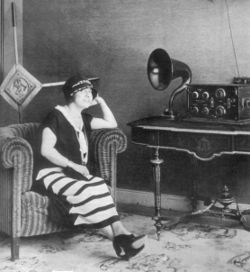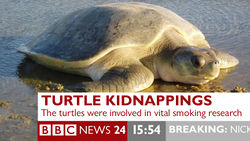User:Sycamore/BBC

BBC or Brits Been to Cambridge is the world famous broadcasting company for London and surrounding satellite colonies of the British Empire. The BBC was founded in 1925 to compete with Josef Stalin's radio stations in Russia and to provide propaganda for British markets. Initially radio was the main medium and the BBC fought the rise of television by arguing that it was impossible to see round corners. However in 1930 the periscope was invented and the BBC was forced accept television and mild nudity such as bare arms.
The BBC is the only communist broadcaster left running in the world outside of North Korea and Russia. The Quango has flatly refused free markets and vows to continue its communist leanings that it has valiantly upheld since its vague conception in 1920.
Currently the company is still wholly dependent on a poll tax from the public regardless of ability to pay, although there have been rebates for conservative voters who protest paying for a service that they were "born to receive". This has been regarded as acceptable by the Socialist Alternative party and whilst they're in power no one feels obligated to complain.
Binding the Nation[edit | edit source]

It was filthy Scottish git John Reith who founded the BBC in 1920 and was the first "Lord of the BBC" John Reith was of course under the thumb of Stalin and Churchill. Their hope was to provide the British intelligence service and the KGB a reasonable worldwide business to hide their operations as well as provide quality propaganda for the British public. The cooperation was also founded to provide a "World Service"[1] for the Fuzzy's as they were still at an inadequate level of submission to the Empire.
The new staff at the BBC was held under the brutal despotism of Reith, whose extreme leftist views derided the staff and persecuted any individuality they showed. New employees at the BBC were also warned when they applied that should they ever stray from wedlock or heterosexuality, they would be burned. As may be expected Reith became something of a one man band outside of his "charming" assistant Mary Whitehouse.
With a World War in the offing, The BBC found itself generally very favourable to Hitler. Reportedly Reith often commented that "A man has a home to keep" however with a change in government in 1938,[2] Reith was forced to resign under government pressure. This fundamentally altered the tone and style of the BBC from its Radio broadcasts to its listings publication, the "Radio Times". From then on, the BBC became absorbed with the pursuit of ratings rather than binding the nation though the license.
Radio[edit | edit source]
Initially in 1925 the BBC was primarily a propaganda institution through the medium of radio. The sets were cheap and easily bought by lonely people with nothing better to do; this went down especially well in Wales where a sheep famine was well underway. Under the colonial power of Britain sets were also shipped to India and the brave souls in China.
The first shows discussed the weather which of course would be raining or sunny depending on the weather above Television Central. "Roof Forecasting" as it is known has continued today, however a volunteer system for Downs’s patients has been adopted in recent times. These "accurate forecasts" are used on the world service. Unfortunately due to the British climate many listeners in Cuba and other sunnier climates have learned to question the viability of BBC reports.
In the 1960s, the era of BBC radio was threatened by the kingdom of Luxembourg and private owners of commercial stations. To combat the capitalists, the BBC heavily "sexed up" its output. The competition was also offered a cut in the license money.[3] However over time, output gradually seemed ever more dictated by short novel "The Siege of Trenchers Farm", particularly in the less than wholesome animal sex drama The Archers.
Radio Times[edit | edit source]

| “ | Yes quite, the Radio Times is indeed a most absorbing and thorough publication. Over the years I’ve learned to accept no substitutes. It's complete bollocks that I ever get the Telegraph. | ” |
These were the words spoken by Oscar Wilde in 1962, and it has become De Rigueur to purchase ones Radio Times during ones morning "constipational". Initially the Radio Times was part of a pamphlet released with "Beehive" a Marxist propaganda paper. However the Radio Times broke off and became part of the BBC in 1940. It is to this day, sustained by license fees as no one wishes to purchase the archaic publication.
The Radio Times has been continued to the present day in its original format with dodgy left wing reviews and un-navigable listings for BBC programming. However unlike the rest of the BBC and mostly the useful "Interweb service", the Radio Times accepts advertisements. The proceeds are used to make up the deficit for Jonathan Ross's annual pay.
Television[edit | edit source]
Television was a difficulty for the BBC, they could not use the invention without a periscope due to fact that "Moving Pictures" cannot travel around the obstacles viewers experienced whilst performing the "Lotus". However in 1950 the periscope was finally invented and early broadcasts were aired across the nation. Viewers were delighted by the snootiness of the broadcasts and the soft porn documentaries the BBC would become famous for.
Many report this golden age for the BBC, with patronizing programming for the working class. The upper class however felt discriminated against by the lack of tits and overly formal programming. This complaint proved to be the catalyst for the formation of ITV, Britian's first commercial station. ITV adopted the commercialism of America and took adverts and phone in scams. Many have commented that you can't tell the difference between the advertisements or the programming that delivers viewers to them. This has led to yet more channels being created, offering different angles and coverage of the same thing.
ITV also brought the grotesqueries of Chris Tarrant to the nation. This was just what the upper class wanted, brain softening drivel and the BBC was forced to up the license fee and make subsidiary channels to compete with the commercial stations.
Kikes, Dykes and Dolls[edit | edit source]

Currently the BBC has gone back to commercial broadcasting strategies; providing sultry ladies for upper class male audiences. Recently Fiona "hot totty" Bruce was hired in 2004 to provide the kind of sex appeal the BBC had lacked, and is now the flagship personality of the new BBC. This has gone down well particularly in recent times with programming becoming ever more dependent on Michel Aspel. There can be nothing more sexual a sight than watching Fiona taunting the audience with her "news slot"
In order to get a job for the BBC you must now be A. Jewish B. Gay or C. A Woman; preferably a combination of all three is the company’s aim. Other fairly recent developments include new channels such as the smash hit BBC Three, a channel dedicated to the happenings of cockney shemale Sienna Miller. Of course there’s also BBC Four, its primary concern is the thoughts and views of sapphic feminist writer Germaine Greer.[4]
Overall these recent changes have been declared a triumph by the board of directors. Apparently these new channels fulfil every aspect of the aims and purpose of the BBC such as entertaining people and providing titillation for a tory audience. A review of the BBC's charter in 2005 has found a clear argument for keeping the communist Broadcaster as it is a great way for recovering back all the money the dole rats claim whilst watching BBC daytime, although the possibility of more tits was recommended.
Footnotes[edit | edit source]
- ↑ World Propaganda.
- ↑ In Russia.
- ↑ A cut from the license fee was sufficient to bribe the pirate’s offshore.
- ↑ Germaine's slot it shifted ever later in the schedule to accommodate the working hours of pervert nightshift security guards.
See also[edit | edit source]
External Links[edit | edit source]
- BBC homepage

